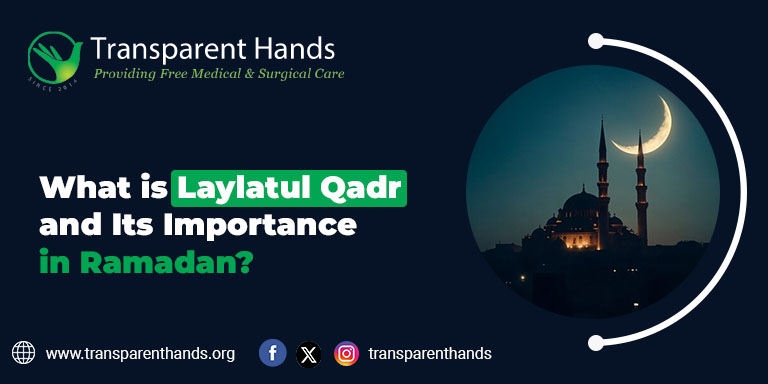What is Laylatul Qadr and Its Importance in Ramadan?

For Muslims, no night is as sacred and mystical as Laylatul Qadr, the night of power or decree. The great mysteries and power of Laylatul Qadr is mentioned in the Quran, where Allah (SWT) says:
“And what can make you know what is the Night of Decree? The Night of Decree is better than a thousand months.” (Surah Al-Qadr, 97:2-3)
Laylatul Qadr falls in the last Ashra (ten days) of Ramadan. While the exact night remains unknown, the believers are encouraged to intensify their efforts to find the great rewards of Laylatul Qadr.
In this article, we will see why Laylatul Qadr is so important in Islam and how to take advantage of this great opportunity to receive its offerings.
Schedule Your Laylatul Qadr Donations
What is Laylatul Qadr?
Laylatul Qadr translates to the ‘Night of Power’ or ‘decree’. While the entire month of Ramadan is filled with blessings and virtues, Laylatul Qadr represents its pinnacle. However, unlike most celebrations, Laylatul Qadr is marked with prayers, supplications, and acts of worship and devotion.
It is the night when the Quran was revealed. According to the Quran:
“Indeed, We sent it down during a blessed night. Indeed, We were to warn [mankind]. On that night is made distinct every precise matter -[Every] matter [proceeding] from Us. Indeed, We were to send [a messenger]” (Surat Ad- Dukhān, 44:3-5)
What is the importance of Laylatul Qadr in Islam?
When is Laylatul Qadr?
A part of the mystique of Laylatul Qadr is that we are not exactly sure when it occurs. We do know, however, that this significant night falls during the last ten days of Ramadan. Some scholars believe that it is likely to be one of the odd-numbered nights, specifically the 21st, 23rd, 25th, 27th, or 29th nights of Ramadan. According to a Hadith:
Some men amongst the companions of the Prophet (ﷺ) were shown in their dreams that the night of Qadr was in the last seven nights of Ramadan. Allah (SWT)’s Messenger (ﷺ) said, “It seems that all your dreams agree that (the Night of Qadr) is in the last seven nights, and whoever wants to search for it (i.e. the Night of Qadr) should search in the last seven (nights of Ramadan) [ Sahih al-Bukhari 2015, Book 32, Hadith 2]
However, many Muslims traditionally observe it on the 27th night. This practice allows believers to maximize their efforts to seek Allah (SWT)’s blessings before Ramadan ends.
What should we do on the night of Laylatul Qadr?
We should try to seek the Laylatul Qadr to please Allah (SWT). Such is its significance that we should seek Laylatul Qadr’s blessings during all of the last ten days of Ramadan. Prayers and Righteous deeds done on the night of Laylatul Qadr will yield the rewards of praying for 83.5 years. To reap the extraordinary rewards of Laylatul Qadr, we should treat it as an extraordinary opportunity. Thus, we should make special arrangements for prayers and supplications.
Give Zakat on Laylatul Qadr
Supplication for Laylatul Qadr
Aishah (R.A) reported: I asked: “O Messenger of Allah (SWT)! If I realize Laylat-ul-Qadr (Night of Decree), what should I supplicate in it?” He (ﷺ) replied, “You should supplicate: Allah (SWT)umma innaka ‘afuwwun, tuhibbul-‘afwa, fa’fu ‘anni (O Allah (SWT), You are Most Forgiving, and You love forgiveness; so forgive me).” (At-Tirmidhi]. Riyad as-Salihin 1195)
“اللهم إنك عفو تحب العفو فاعفُ عني”
Recitation of the Quran & Nawafil
Offering Nawafil (optional prayers) and reciting the holy Quran are ways to seek rewards on Laylatul Qadr. It is a perfect time to be grateful to Allah (SWT) for all the blessings he bestowed on us.
Repentance & Self-Reflection
Laylatul Qadr is a great time to reflect on our behavior and work on correcting it. Although repentance should be part of our daily routine, Allah (SWT) is more likely to forgive our misgivings and transgressions on this great night. Acknowledging our mistakes can help us find peace and more profound spiritual growth.
The Prophet said: “I seek the forgiveness of Allah (SWT) and repent to Him one hundred times each day.” (Sunan Ibn Majah 3815)
Kindness & Charity
Islam emphasizes building and maintaining relationships. Since we do not live in isolation, we must assist those who deserve our financial and moral support. Laylatul Qadr is an excellent opportunity to practice generosity.
The Quran promises:
“The example of those who spend their wealth in the way of Allah (SWT) is like a seed [of grain] which grows seven spikes; in each spike is a hundred grains. And Allah (SWT) multiplies [His reward] for whom He wills. And Allah (SWT) is all-Encompassing and Knowing.” (Surat Al-Baqarah, 2:261)
The Significance of 1st, 2nd, and 3rd Ashra of Ramadan
Why Donate to Transparent Hands?
Transparent Hands offers free medical and surgical care to Pakistan’s most deserving patients. We organize free medical camps and provide free surgeries and various treatments. We also offer a secure and accessible way to make online donations, including Zakat and Sadaqah. Our unique crowdfunding platform ensures you know who you’re helping and how your contributions impact lives. You can change many lives and bring hope and light to their families. The Quran says
“And whoever saves one – it is as if he had saved mankind entirely. (Surat Al-Mā’idah 5:32)”
Donate now to make a difference and help us continue our mission of providing free healthcare to the most deserving patients in Pakistan.
Conclusion:
This is a night of great significance for Muslims, as it brings unparalleled blessings and divine mercy. It is a time for devotion, self-reflection, and charity. As we approach this holy occasion, let us remember the importance of community support and generosity, especially towards charities like Transparent Hands, which provide essential care to those in need. Let us experience piety in its true essence by praying to Allah (SWT) and fulfilling our responsibilities to our fellow human beings as compassionate and grateful individuals.











Leave a Reply